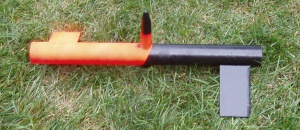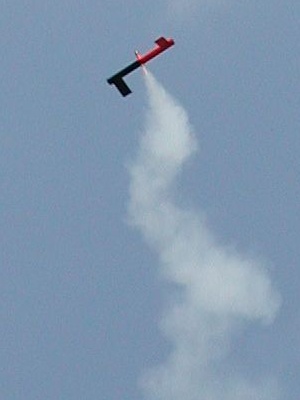Scratch Whirlygig-24 Original Design / Scratch Built
Scratch - Whirlygig-24 {Scratch}
Contributed by Dick Stafford
| Manufacturer: | Scratch |
Brief:
When I first saw Matthew McFarland's Whirlygig in
FlisKits'
Deuce bash Contest, I immediately knew I had to build one. This is a 24mm
version of this odd, helicopter design. Since there was little theory to help
determine stability (how do you swing test this anyway?), I built mine out of
leftovers. As a result, the design is not optimized. It is heavier and chunkier
than it probably has to be. I am providing this to show the overall dimensions
that seem to result in a stable model. If you build one with another form
factor, please launch safely! Note I used an oversize lug so I could fly from
the high power pads. I invite you to read more about Whirlygigs and ask your
questions on the Yahoo
OddRocs group.

Construction:
The parts list:
- Mailing tube, 2" x 22"
- 24mm tube, 4.125"
- 24mm PNC, type unknown, 2.5"
- ¼" balsa fin stock (2 pieces, 3" x 7")
- ¼" launch lug, 2.25"
Building this rocket was easy. I first found the center of the tube and marked centerlines on the top and bottom. I then located the fins based on these centerlines. My fins are approximately 120 degrees apart and are inset one inch from the end of the tube. The lug was mounted in a notch next to the motor tube. I used epoxy for the cone, motor tube, and launch lug. Wood glue was used for the fins. The fins extend all the way across the tube, leaving a 5" x 3" surface exposed. The motor tube extends below the body tube by 3/8".
Finishing:
The tube I used was speckled with paint from a previous project and the nose
cone was green. That's all the finishing it got for its maiden voyage. I later
filled the balsa and painted the rocket half black and half fluorescent orange.

Flight:
I have flown my 'Gig 4 times, once on a D12-0, twice on E9-Ps and once on an
Ellis F20. I added a tape thrust ring and friction fit the motor lightly. The
first flight was on the D12 and I didn't know what to expect. The boost was
straight and had a slow rotation. It didn't go high enough to begin spinning on
the way down. The E9 flights go much higher, and it attained enough altitude to
begin spinning on the way down. The F20 flight, needless to say, was faster and
even higher. Oddly enough, the 'Gigs do not seem to rotate while on the rod, so
I don't know how much the spinning has to do with stability. This effect is not
easy to see on the F20, but is clear on the smaller motors.
The launch photo is courtesy of Vertical Force Rocketry.
Summary:
This is a fun rocket and is sure to get everyone's attention. I built another
version that used Nike-style fin cans in place of the balsa. All I can say is
make sure you have enough fin area. That version was not stable!
Sponsored Ads
 |
 |











